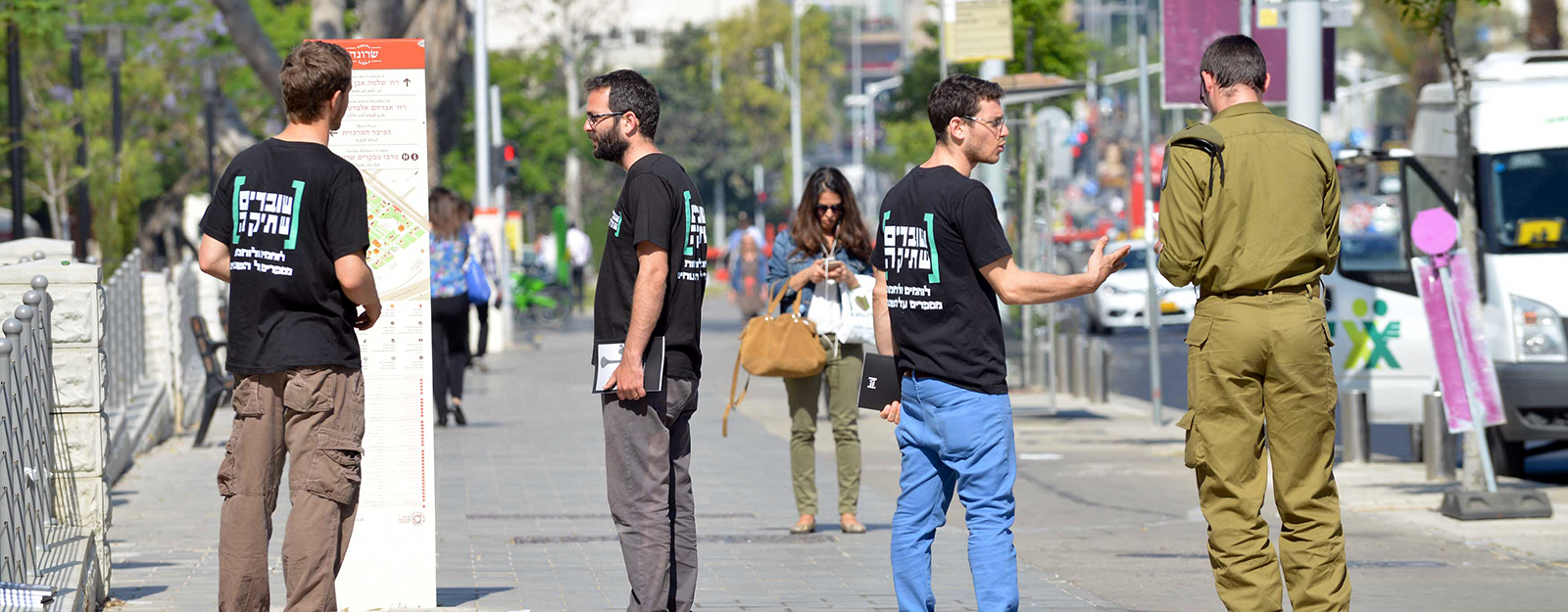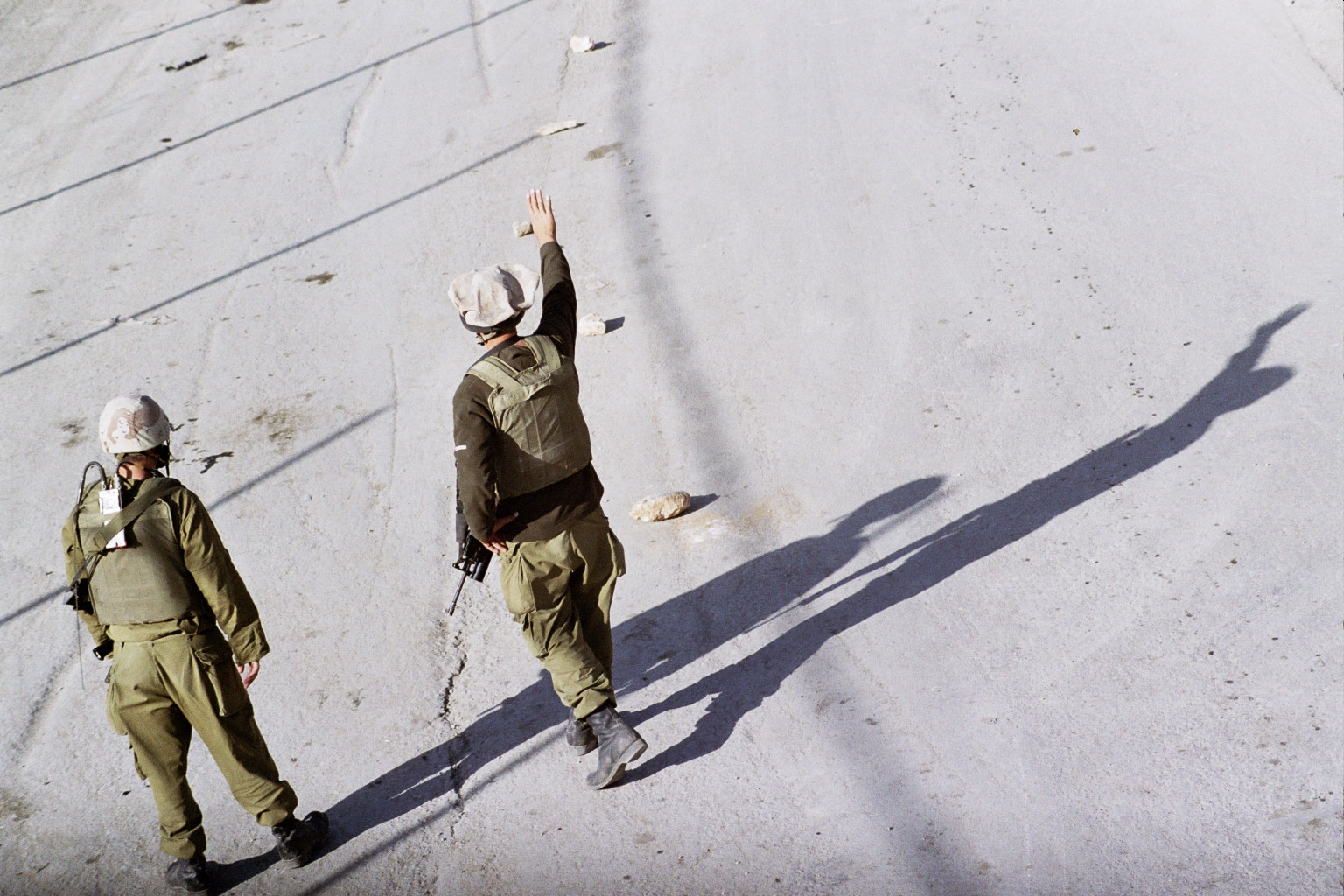Let’s begin with your time on reserve duty. Okay. There was one time when stones were thrown at us from one of the villages, not at us, sorry, at a vehicle traveling on the route, on Road 505. The response to that was a kind of raid on the village, we went from house to house, took people out of their homes, talked to them, and at the same time made what’s called noise in the village by throwing stun grenades in the streets and yards, or shooting flares in the air. There was no physical damage, beatings or anything, to any civilians. My opinion was that the whole action was really unnecessary, and it was indeed stopped in the middle by the brigade commander. The instruction to stop it came towards the end.
Stones are thrown and you find that out at the checkpoint, when the car gets there? Or do you get a report? I don’t exactly know how we found out.
What village do you enter? How do you know where the stone was thrown from? The road passes right below the village.
Do you remember the name of the village? Yes, Marda.
When did this happen? When was your reserves term of duty? Just after the war in Lebanon, must have been September, I think. September or August 2006.
And what happens in the village? Who leads the action? I don’t know where on the chain of command the orders came from, whether from the company commander or battalion commander. You know what? I don’t want to talk about who led it and what the reasons were.
On what level? It was on the company level, yes. You know what, I’m more interested – you want to hear about the reasons why it was problematic. I think it’s very problematic, and I see it more as a reservist than I did during my regular service, there’s a bit of a change in the army’s approach, which doesn’t trickle down into the reserves. If we take, you take people who served during the first intifada or even earlier, around 1989-1990, you find that what they know as army action in the Territories and what the army wants done today are two entirely different things. You hear stories from their time, I suppose it was normative back then, unfortunately, about coming in and making a show of force and enforcing Israeli rule in the streets. If it means shooting at the Muezzin’s loudspeaker or walking around the village and overturning market stalls and other such stuff.
These are things you heard? These are things I heard. It was a period, that’s how the army worked in the Territories back then. It was also relatively much calmer then, meaning soldiers could walk around, two at a time, through the street and nothing would happen, but there was this standard of showing the IDF’s dominance. Now, these people have not done reserves duty in the Territories for quite a while. The army – I don’t know to what extent you’re in the picture – but for a long while, reserves training and deployment were held back in order to save money, and now they’re coming back to the Territories in an entirely different situation. What happens is, the army’s approach has become much more proper, that it’s more about combat, okay? There are still acts of policing, if it’s the checkpoint, or if it’s checkpoints in general, but the activity is much more combative. You lay ambushes, you do raids, arrests, foot patrols. You don’t walk around the village talking to people.
So what happened at Marda? There are guys there who didn’t experience the first intifada, who grew up in the Territories of 2000. Yes, so this is where you could really see the difference. They secure a corner, they haven’t really understood their mission. Personally, I wasn’t too happy about it either. I thought it meant unnecessary risk to soldiers.
What was the objective? The objective was supposed to be – again, you know what, I can’t tell you exactly what the objective was. To stop stone-throwing from the village, whether by intimidating the villagers or – at the end of the day, most of those throwing stones are 13 or 14-year-old kids, especially in the quieter villages. The idea is more that the father will catch the boy, give him a few smacks. At the end of this whole story, the father will catch the kid and give him a few smacks with a stick, case closed. I simply believe it’s not the infantry’s role. That’s the biggest damage. Is this a terrible violation of human rights? Okay, it’s not good. You don’t go into a village and start taking out women and children from their homes. It’s not, that’s not how an army operates.
That’s what happened? Yes. That’s what happened. You go from house to house, knock on the door.
Is it a large village? Not too large.
How long did it take? I suppose we were there about an hour, an hour and a half.
You knock on the door and get everyone out? Knock on the door, bring out the head of the family, tell him what happened, talk to him, let him go back inside. Again, shall I tell you this was some terrible violation of human rights? No. But there was a bit, in the end, soldiers let loose there. I didn’t like that. [Throwing] flares as much as they wanted, throwing stun grenades just for fun. To be honest, it can’t be helped. It’s sad, but any unit you’d pick in the IDF, perhaps not the crack units, but any infantry battalion you choose and put in this situation, that is what soldiers will do. You can’t avoid it. Soldiers will be soldiers. You enlist what you have, not what you would like to have. People like to mess around.
Was this discussed later? Punished? No, there was no punishment, because after all, reserves duty is a bit different. It’s not that people came and just fired for the hell of it, but you know, the level of command there is a bit of a problem. It’s not some squad commander in the infantry who sees himself as responsible. He’s responsible for the mission at the moment. At least some of them. Some are better, and I’m happy with that. So you can’t say that someone broke the rules. But I’ll tell you what, the brigade commander did stop it in the middle.
The whole mission? Yes. That brigade commander has a good head on his shoulders, he thinks properly. As soon as he realized what was going on there, he gave an order for everyone to leave.
The whole village was outdoors? Not the whole village. Again, we went from door to door. It’s not a tiny village, but not huge either. It’s a medium-size village. And you go from door to door, take out the guy, talk to him, let him go back inside.









 testimonies
testimonies  media & content
media & content 










 Knock on the door, bring out the head of the family
Knock on the door, bring out the head of the family 

 terms of use & privacy policy
terms of use & privacy policy